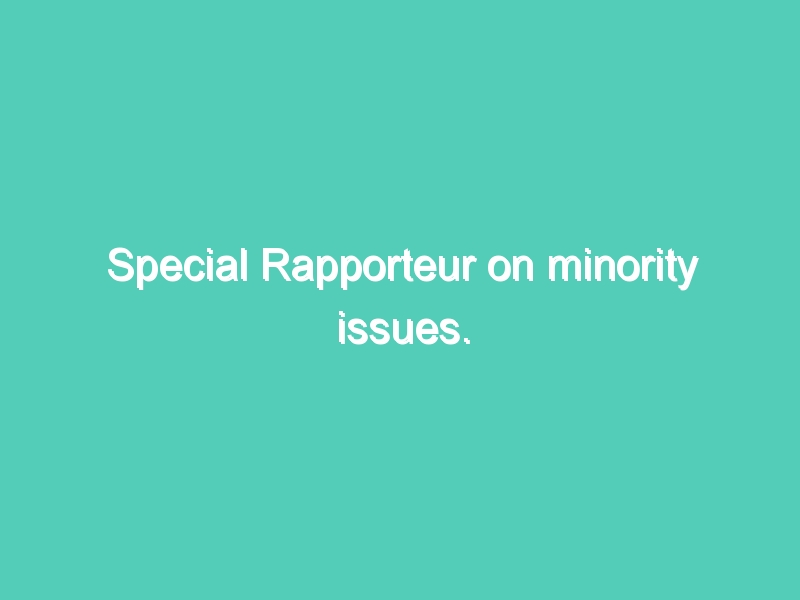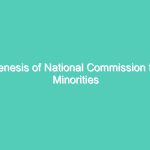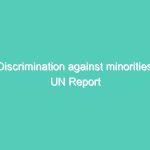Minorities in all regions of the world continue to face serious threats, discrimination and racism, and are frequently excluded from taking part fully in the economic, political and social life of their countries. Today, minority communities face new challenges, including legislation, policies and practices that may unjustly impede or even violate minority rights. The outcome document of the 2005 World Summit of Heads of State and Government, approved by the General Assembly, notes that “the promotion and protection of the rights of persons belonging to national or ethnic, religious, and linguistic minorities contributes to political and social stability and peace and enriches the cultural diversity and heritage of society”.
Respect for minority rights assists in achieving stable and prosperous societies, in which human rights, development and security are achieved by all, and shared by all.
The dynamics of majority/minority relationships lead to the emergence of a range of minority issues which provide challenges and opportunities for States and societies as a whole. Such issues, in all spheres of life, are identified and articulated both by minorities and by States seeking to manage diverse societies. Within this wider context of minority issues, the normative framework provided by minority rights should be understood as a necessary element to ensure integrated societies and to promote social inclusion and cohesion. In such societies, various national, ethnic, religious and linguistic groups are able to live confidently together, practice their religions, speak their own languages and communicate effectively, recognizing value in their differences and in their society’s cultural diversity.
Mandate
The mandate of the Special Rapporteur on minority issues was established in resolution 2005/79 by the Commission on Human Rights on 21 April 2005. The mandate was subsequently renewed by the Human Rights Council in its resolutions 7/6 of 27 March 2008, 16/6 of 24 March 2011, 25/5 of 28 March 2014 and 34/6 of 23 March 2017. Resolution 34/6 renews the mandate under the same terms as provided by resolution 25/5.
In resolution 25/5 the Human Rights Council extended the mandate as Special Rapporteur on minority issues for a period of three years and requests the mandate holder:
(a) To promote the implementation of the Declaration on the Rights of Persons Belonging to National or Ethnic, Religious and Linguistic Minorities, including through consultations with Governments, taking into account existing international standards and national legislation concerning minorities;
(b) To examine ways and means of overcoming existing obstacles to the full and effective realization of the rights of persons belonging to minorities;
(c) To identify best practices and possibilities for technical cooperation with the Office of the High Commissioner, at the request of Governments;
(d) To apply a gender perspective in his/her work;
(e) To cooperate and coordinate closely, while avoiding duplication, with existing relevant United Nations bodies, mandates and mechanisms and with regional organizations;
(f) To take into account the views of and cooperate closely with nongovernmental organizations on matters pertaining to his/her mandate;
(g) To guide the work of the Forum on Minority Issues, prepare its annual meetings, to report on its thematic recommendations and to make recommendations for future thematic subjects, as decided by the Human Rights Council in its resolution 19/23;
(h) To submit an annual report on his/her activities to the Human Rights Council and to the General Assembly, including recommendations for effective strategies for the better implementation of the rights of persons belonging to national or ethnic, religious and linguistic minorities;
The mandate of the Special Rapporteur complements and enhances the work of other UN bodies and mechanisms that address minority rights and minority issues, including the Forum on Minority Issues.
Methods of work
In carrying out her mandate, the Special Rapporteur will:
-receive information from diverse sources including States, expert bodies, United Nations agencies, regional and other inter-governmental organizations, NGOs and other civil society organizations. Based on such information, she will issue communications to States concerning implementation of the Declaration on the Rights of Minorities, where appropriate;
– submit annual reports on the activities undertaken by the mandate to the Human Rights Council includingthematic studies on key minority rights issues;
– undertake, at the invitation of Governments, country visits to further constructive consultation, observe relevant programmes and policies, register concerns, and identify areas for cooperation. She will study national legislation, policy, regulatory frameworks and institutions and practices, in seeking to promote the effective implementation of the Declaration on the Rights of Minorities.
Source: https://www.ohchr.org/EN/Issues/Minorities/SRMinorities/Pages/SRminorityissuesIndex.aspx



